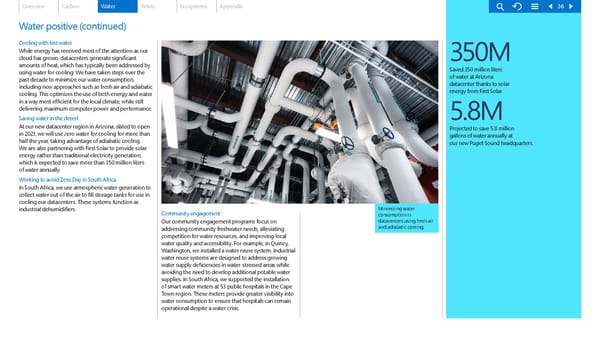Overview Carbon Water Waste Ecosystems Appendix 36 Water positive (continued) Cooling with less water While energy has received most of the attention as our cloud has grown, datacenters generate significant 350M amounts of heat, which has typically been addressed by Saved 350 million liters using water for cooling. We have taken steps over the of water at Arizona past decade to minimize our water consumption, datacenter thanks to solar including new approaches such as fresh air and adiabatic energy from First Solar. cooling. This optimizes the use of both energy and water in a way most efficient for the local climate, while still delivering maximum computer power and performance. 5.8M Saving water in the desert At our new datacenter region in Arizona, slated to open Projected to save 5.8 million in 2021, we will use zero water for cooling for more than gallons of water annually at half the year, taking advantage of adiabatic cooling. our new Puget Sound headquarters. We are also partnering with First Solar to provide solar energy rather than traditional electricity generation, which is expected to save more than 350 million liters of water annually. Working to avoid Zero Day in South Africa In South Africa, we use atmospheric water generation to collect water out of the air to fill storage tanks for use in cooling our datacenters. These systems function as industrial dehumidifiers. Community engagement Minimizing water consumption in Our community engagement programs focus on datacenters using fresh air addressing community freshwater needs, alleviating and adiabatic cooling. competition for water resources, and improving local water quality and accessibility. For example, in Quincy, Washington, we installed a water reuse system. Industrial water reuse systems are designed to address growing water supply deficiencies in water-stressed areas while avoiding the need to develop additional potable water supplies. In South Africa, we supported the installation of smart water meters at 53 public hospitals in the Cape Town region. These meters provide greater visibility into water consumption to ensure that hospitals can remain operational despite a water crisis.
 Microsoft Environmental Sustainability Report 2020 Page 35 Page 37
Microsoft Environmental Sustainability Report 2020 Page 35 Page 37